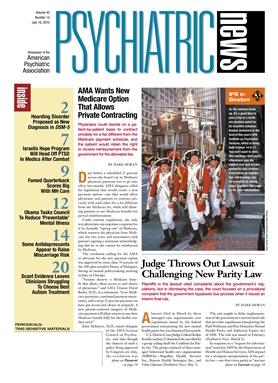Days before a scheduled 21 percent across-the-board cut in Medicare physician payment was to go into effect last month, AMA delegates called for legislation that would create a new payment option—one that would allow physicians and patients to contract privately with each other for a fee different from the Medicare fee, while still allowing patients to use Medicare benefits for partial reimbursement.
Under current regulations, the only way physicians can negotiate a separate fee is by formally “opting out” of Medicare, which removes the physician from Medicare for two years and necessitates each patient's signing a statement acknowledging that he or she cannot be reimbursed by Medicare.
The resolution calling for the AMA to advocate for the new payment option was approved by more than 70 percent of the 500-plus member House of Delegates during its annual policymaking meeting in June in Chicago.
“Seniors deserve a Medicare benefit that allows them access to and choice of physicians.” said AMA Trustee David Barbe, M.D., in a statement. “Low Medicare payments, continued payment uncertainty, and a steep 21 percent payment cut have put access and choice in jeopardy. A new patient-centered category of Medicare payment will allow seniors to use their Medicare benefit fully for the health care they need.”
John McIntyre, M.D., senior delegate of the AMA Section Council on Psychiatry, said that though the chances of such a policy being approved by Congress are slim, the resolution was nevertheless a statement reflecting mounting exasperation among doctors with Congress's repeated failure to fix the payment formula. (The Section Council on Psychiatry consists of APA, the American Academy of Child and Adolescent Psychiatry, and the American Academy of Psychiatry and the Law.)
McIntyre told Psychiatric News, “Virtually any member of Congress you speak with says that the sustainable growth rate [SGR] component of the formula doesn't make sense and needs to be fixed, but they don't fix it because fiscal conservatives in Congress say it would be too costly. But there is a growing sense that the entire Medicare payment formula just is not workable and that we should return to physicians and patients privately contracting.”
For seven consecutive years, the SGR component of the formula has required that increases in Medicare volume be compensated for by decreases in physician payment, without taking into account increases in practice cost. Each year, the required cuts have grown progressively steeper, only to be averted by last-minute Congressional action.
This year, Congress enacted a series of short-term postponements of a 21 percent pay cut, but the deadline finally came when the cut became active on June 17. That same afternoon, the Senate voted yet again to delay the cut for another six months and approved a 2.2 percent increase through November. On June 24 the House voted to adopt that Senate proposal.
“The [AMA] resolution says that doctors and patients should be able to freely contract without penalty to either party and in a manner that does not forfeit benefits otherwise available to the patient,” McIntyre explained. “The assumption is that the physician could decide on a patient-by-patient basis to contract privately and that, most importantly, the patient could still get receive the Medicare allowable rate as a partial reimbursement.”
He said senior groups such as AARP would likely oppose such a policy, and many in Congress would see the move as undermining the Medicare program.
But McIntyre said the concept is not without logic. He noted, for instance, that in his own practice he sees some patients who are relatively well-to-do and would be pleased to see him compensated fairly for services, and who could with relative ease shoulder the cost of a usual-and-customary fee.
Moreover, many such patients are aware that their services under Medicare are being indirectly subsidized by non-Medicare patients who are not well off but who are paying higher fees imposed by physicians trying to compensate for the low rates they receive for treating Medicare patients.
Finally, the steadily mounting cuts necessitated by the current payment formula are now at levels widely acknowledged as making it difficult for many doctors to continue treating Medicare patients.
“This is no way to run a major health coverage program—already the instability caused by repeated short-term delays is taking its toll,” said AMA President Cecil Wilson, M.D. “About 1 in 5 physicians say they have already been forced to limit the number of Medicare patients in their practice. Nearly one-third of primary care physicians have already been forced to take that action. The top two reasons physicians gave for these actions were the ongoing threat of future cuts and the fact that Medicare payment rates were already too low.”

